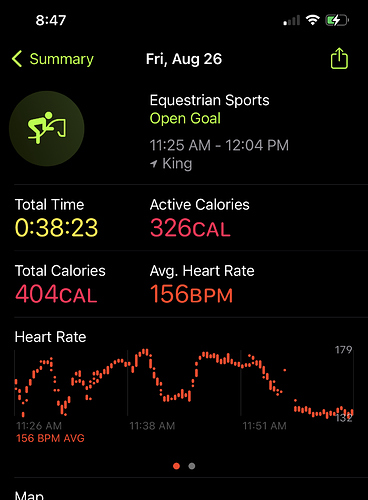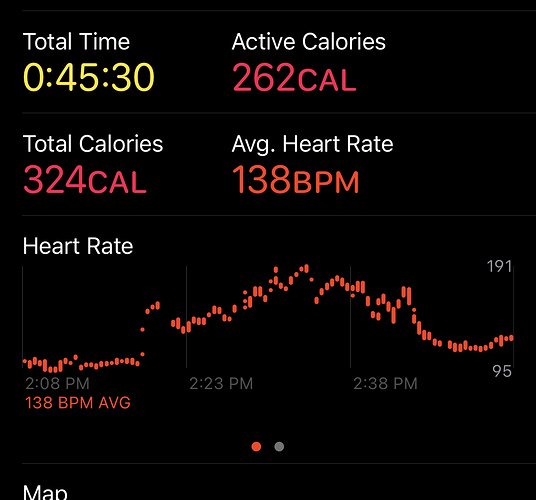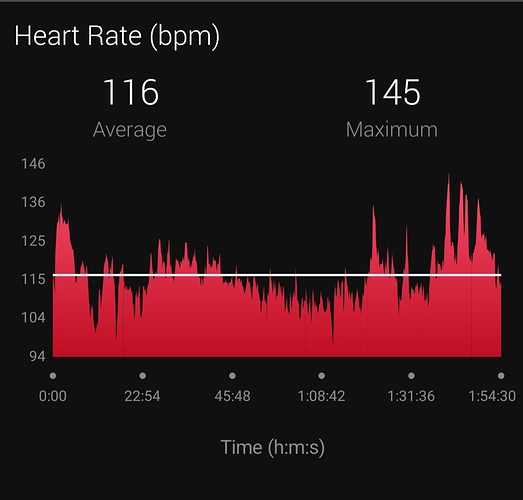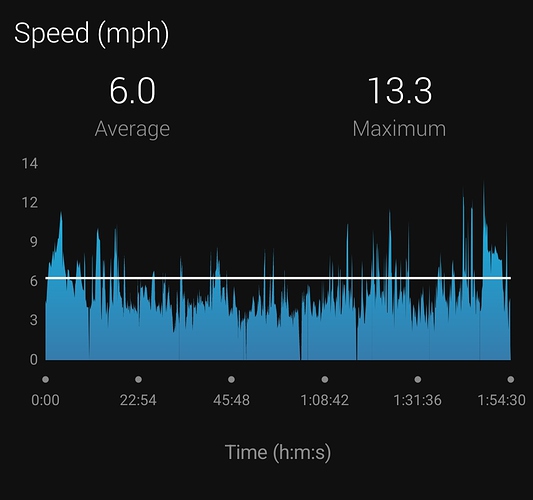This is what today’s lesson looked like, HR wise. I didn’t remember to turn my watch on until after my warm up though. Obviously I need to build my stamina to sustain the more intense work for longer periods of time.
Just a thought- but do you think your watch is accurate? I got rid of my old Garmin watch because it was not recording things (esp HR) correctly. I did a 19 mile trail run/ hike yesterday with 2300’ elevation gain in 90 degree weather and that’s higher than my HR went most of the workout. Not that people don’t react differently, have different amounts of fitness etc but that seems REALLY high for riding, even a good riding workout
I would find it odd, except for every other exercise I do the watch seems to be bang on with what I’d expect my HR to be based on activity and level of exertion. I’ve never tried stopping and manually measuring my HR while riding but I will. Certainly the way I feel when my watch says it’s that high matches the number. That’s why I think the people who suggest I’m holding my breath may be on to something.
I think the calorie counts from the watch can be way off, but I assume it’s measuring my actual heartbeats to get an HR number? Will try taking my pulse next time to compare. Definitely an interesting thought.
I find with mine, if I don’t have it on tight enough it skews my HR numbers- like maybe there’s not enough contact? The holding your breath thing will definitely do it too- I used to almost pass out after a jump course because I’d forget to breathe lol
Here is an example of mine getting way up there
I don’t think accuracy is an issue going through the wearable EKG and things lining up consistently. I’m sure there are things that can skew it a bit, but my cardio doctors took the screenshots I shared with them seriously.
I would keep some screenshots to share with your doctor next time you visit as well, I don’t think that ever hurts.
Here’s another thought -
I have a very specific breathing rhythm when running, that keeps my heart rate at a sustainable level that I have good endurance. When I try to swim, altering my breathing rhythm to match that of swimming means my heart rate goes through the ROOF. For that reason, I suck at swimming (I’m not going to drown, but I’m not getting anywhere fast).
Do you have a breathing rhythm that’s getting interrupted by the instructors requests to do this-and-that? Or are you altering it to speak back to him/her? Or are you altering it in an attempt to hear him/her better?
I suspect I might have no breathing rhythm at all when riding lol. I rode on my own yesterday and heart rate was still in the 175 range. I didn’t perceive it was exhausting though, because I was mostly schooling transitions so the high HR was only for very short intervals at a time.
I had a full cardiac workup last year including 72 hour Holter monitor and ultrasound and nothing of concern there. And no issues with any other exercise that I perceive to be strenuous, so I’m not worried there’s an underlying physical issue aside from my weight and general lack of fitness. It’s definitely specifically tied to riding, and breathing seems to be the likely culprit.
I’m going to try and warm up on my own slowly before my lessons start so hopefully I can keep going longer in my lessons and not keep stopping for short breaks. My poor trainer is very patient with me but I’m sure that has its limits!
I’m definitely going to guess breathing rhythm. When I first started back riding after years away I told my coach “don’t worry if I look/sound like an idiot. I’m just trying to breathe!” I was nervous to be riding again and out-of shape, double whammy.
Any tips for developing a breathing rhythm?
It’s kind of trial and error. You can breathe with the beat of the gait, so for example, if you’re posting the trot, breathe in on the up, out on the down. That inflation of your chest can also help be a reminder to not lean forward. But you might find that in on the down and out on the up feels more natural to you.
I like to count mine, usually in counts of 3 or 4 - in,2,3 out,2,3. Depends on the tempo and how otherwise distracted I am.
I definitely haven’t perfected it, but I know it works for me. I just need to practice.
I really like the centered riding breathing exercises- I combine that with counting. Like most things, it eventually becomes intuitive without the counting etc but I definitely go back to it when I’m in a stressy situation (like the start of an endurance ride)
I definitely know how to breathe properly, both from Pilates and singing. I suspect the issue is I hold my breath, so counting a rhythm like I used to when running is a good suggestion
I dont have any advice regarding heart rate…
But i had a really awesome gym session with my gym trainer last week about doing over head presses just with dumbbells amd controlling my breath on the ups and downs. Helps so much with riding!
When your HR gets that high, you are probably anaerobic so of course you can’t maintain it for long and need a break. One way to reduce it is to get fitter so even when you spike high, you can recover quickly. Another is to try to raise your threshold power. This is a cycling term largely but the concept comes from the muscle strength required to maintain your max sustainable effort. Going above that, you can’t sustain long at all. But staying below that, you can go for forever.
Some of this is going to come from your core strength training as far as riding goes. But you can work on the quick recovery part with over/under threshold intervals with your other activities. The way to do that in cycling is to do a 20 minute power test. You want to go as hard as you can to where you make it 20 minutes but you are DONE at 20 minutes. Measuring power is best but you can do it with the HR data you have. Like when I used to do short time trials before I used power, I would maybe aim for about 170-175bpm (likely lower now due to age as I could get into the 190s for a max effort at that time). Then you do over/under intervals where you might go 105-110% of that effort for a short period like maybe 5 minutes. Then recover, but your recovery is not rest, you’re just down to where you feel you can cruise. Just get back under threshold for a few minutes until you feel it’s sustainable. Then repeat.
What are you doing in this lesson? Do you remember?
Of course fitness is important, but it’s really hard to gauge your fitness on any activity without knowing what it was. If this was a run and it was flat, I’d assume you were over threshold in general because you were running too fast, and had to walk in the middle. If it was a run with three distinct climbs, I would look at it and and think it was fine.
I see three separate over threshold areas in this workout - what were those segments? (Trotting, sustained canter? Jumping?)
Tort and canter with some walk breaks. Lateral work at the trot and some mediums with collected over x. Canter can’t really remember…I think long diagonals to counter canter and back. Probably some transitions
Interesting. So I think that breathing (or not breathing) may be an issue, and also mental exertion + physical exertion resulting in adrenaline. I wonder if other people could post similar sessions to compare HR. Because if you imagine asking a horse for a command and not being 100% thrilled with the result so you continue to ask and refine the work - this would certainly result in a higher HR than just trot sets on the rail. If you imagine a horse not responding and the rider getting frustrated you would expect a much higher HR.
I’m just not sure you can compare riding HR to anything like cycling or running. Of course increased fitness will help, but I would still expect fluctuations including working up to your max HR at times when it’s not necessarily just physical exertion. Sort of like cycling in busy traffic - you would expect a higher HR than if you were alone on the road.
Here is mine from from a ride a couple months ago-
High stress ride (East Coast Equathon Championships), tough terrain, HOT and my mare was being an arse about life in general, mostly trot/gait and canter, a little bit of walk. I know where my pulse spiked at the end was from when she decided she should buck and then try to bolt down the mountain 
I’ll try tracking it just for fun sometime but I’m sure if I’m just trotting and catering around the hayfields for 30 minutes my heart rate doesn’t go anywhere near when I’m schooling or having a lesson. Apparently dressage is hard lol




